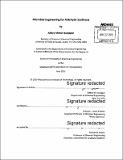Microbial engineering for aldehyde synthesis
Author(s)
Kunjapur, Aditya Mohan
DownloadFull printable version (15.56Mb)
Other Contributors
Massachusetts Institute of Technology. Department of Chemical Engineering.
Advisor
Kristala L. Jones Prather.
Terms of use
Metadata
Show full item recordAbstract
Microbes have been engineered to produce many useful classes of chemicals from renewable carbon sources instead of from finite petroleum reserves. Aldehydes represent a class of chemicals that has been challenging to obtain using microbes given the rapid conversion of aldehydes into their corresponding alcohols that occurs naturally. Microbes are thought to have evolved numerous endogenous enzymes responsible for catalyzing these conversions in order to alleviate the negative effect of many aldehydes on cellular processes. In this thesis, we investigate several aspects of microbial aldehyde synthesis. Driven first by the hypothesis that targeted gene deletions could decrease endogenous aldehyde reduction in a model E. coli host strain, we demonstrate that benzaldehyde accumulation occurs upon deletion of a combination of genes encoding enzymes known to have benzaldehyde reductase activity in vitro. Using deletion subset studies and quantitative real-time PCR, we discover that deletion of many, but not all, of these genes is required to curtail endogenous reduction. We also show that the same engineered strain has a significantly decreased rate of reduction of other aromatic aldehydes. As an added benefit, cell growth rate is unaffected by these deletions. We demonstrate the utility of this strain for two applications: (i) conversion of glucose into vanillin, which is the most widely used flavoring additive; and, (ii) conversion of benzaldehyde and glucose into L-phenylacetylcarbinol, which is a chiral pharmaceutical intermediate. We next explore the ability to produce and retain non-aromatic aldehydes with the specific objective of studying the conversion of fatty aldehydes into gasoline-range alkanes. We find that a carboxylic acid reductase (Car) from Nocardia iowensis achieves biosynthesis of aldehydes from free fatty acid substrates ranging in carbon chain length from C4 to C10. The use of Car, the engineered host strain, and previously elucidated pathways to free fatty acids enables production of alkanes ranging from C3 to C9. Although alcohol byproduct formation significantly decreases, it does not significantly increase alkane titer because of poor aldehyde decarbonylase kinetics. Additional work presented in this thesis seeks to identify and surmount limitations in aldehyde biosynthesis in vitro and in E. coli de novo vanillin biosynthesis.
Description
Thesis: Ph. D., Massachusetts Institute of Technology, Department of Chemical Engineering, 2015. Cataloged from PDF version of thesis. Includes bibliographical references (pages 140-151).
Date issued
2015Department
Massachusetts Institute of Technology. Department of Chemical EngineeringPublisher
Massachusetts Institute of Technology
Keywords
Chemical Engineering.